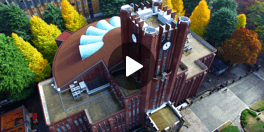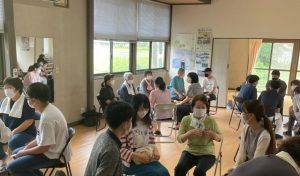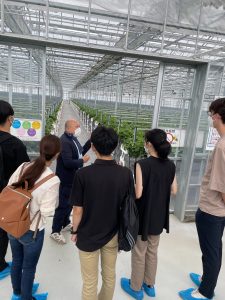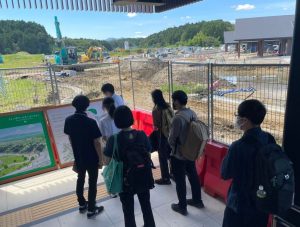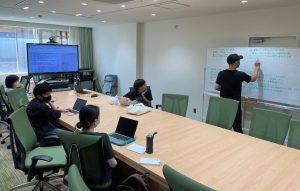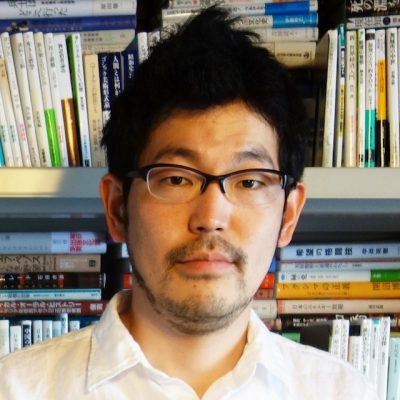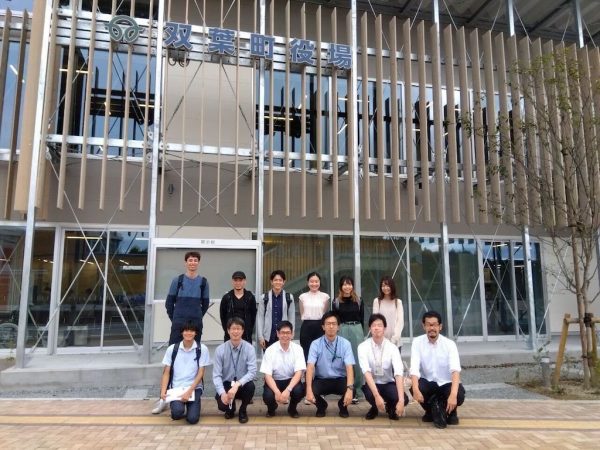
October 4, 2022
レポート:東京大学×伝承館・体験活動プログラム共同研究フォーラム2022 「帰還困難区域の『街づくり』を考える。」Report: The University of Tokyo & The Great East Japan Earthquake and Nuclear Disaster Memorial Museum Hands-on Activities Program Joint Research Forum 2022: Thinking about “Town planning” of Difficult-to-Return Zones
2022年9月16日、福島県双葉町にある東日本大震災・原子力災害伝承館にて、「東京大学×伝承館・体験活動プログラム共同研究フォーラム2022」が開催されました。本フォーラムは開沼研究室の主催。体験活動プログラム「帰還困難区域の『街づくり』を考える。」の参加学生が登壇しました。
体験活動プログラムとは、本学の学部学生及び大学院学生であれば誰でも参加できる体験型教育プログラムで2012年度から実施されています。今年は74のプログラムが用意され、「帰還困難区域の『街づくり』を考える。」はその一つとして、工学系研究科修士課程の菊池裕太さんが企画提案し採用されたものです。開沼研究室が活動指導を、学際情報学府修士課程に在籍中で浪江町在住の葛西優香さんらがアドバイザーをつとめました。
参加者は、7月から9月にかけてミーティングや現地訪問を重ねました。短期間での集中的なプログラムでしたが、当初は全く福島への訪問の経験が無かったという学生も、地元自治体職員や住民の方々への聞き取りや帰還困難区域、除染除去土壌等を保管する中間貯蔵施設などでのフィールドワークを経験し、自治体面積の50%以上が帰還困難区域に指定されてきた浪江町・双葉町・大熊町の街づくりに具体的・先進的な提案をしました。現地調査の日程が、偶然にも、11年半に渡ってその全域に人が住むことができない最後の自治体となった双葉町への住民の居住再開の瞬間に重なり、その催しに立ち会うこともできました。
このプログラムに参加した馬路ひなのさん(社会情報学コース)は「福島への理解を深める一心で参加しましたが、刺激的な他学部、研究科の学生との出会いがありました。集まったのは都市工学、公共政策、自然環境学、国際協力学、法学などを専攻する学生で、報告会に向けたチームでの議論は、各々の学問領域特有の論理や価値観がぶつかる異文化コミュニケーションそのもの。他分野の視点や問題解決のアプローチに触れたり揉まれたりし、チームで落とし所を探りながら協働する経験は、普段の授業では得られないものだったかもしれません。プログラムの参加者や開沼先生、アドバイザーの方々、訪問先の方々との対話から得た気づきを、修士論文やその先の学びへ活かしたいと思います」と語ります。
10年の歴史を持つ体験活動プログラム。多様なプログラムが充実しているものの、学際情報学府の学生に広く知られているとは言い難い現状があるかもしれません。
今後も体験活動プログラムは続いていきます。機会があればぜひ次年度以降のプログラムに参加してみてください。
記事:開沼博(准教授)
On September 16, 2022, “The University of Tokyo & The Great East Japan Earthquake and Nuclear Disaster Memorial Museum Hands-on Activities Program Joint Research Forum 2022” was held at The Great East Japan Earthquake and Nuclear Disaster Memorial Museum in Futaba Town, Fukushima Prefecture. This forum was organized by Kainuma Laboratory. Students participating in the Hands-on Activity Program “Thinking about ‘town planning’ of hard-to-return zones” spoke at the forum.
Hands-on Educational Programs are open to all undergraduate and graduate students at the University of Tokyo and have been implemented since 2012. This year, 74 programs are available, and “Thinking about ‘town planning’ in Difficult-to-Return Zones” is one of them. It was proposed by Yuta Kikuchi, a master’s course student in the Graduate School of Engineering; Kainuma Laboratory provided guidance, and Yuka Kasai, a master’s degree student in the Graduate School of Interdisciplinary Information Studies and a resident of Namie Town, served as an advisor.
Participants held a series of meetings and site visits from July to September. Although the program was intensive and took place in a short period of time, the students, who at first had no experience visiting Fukushima, were able to gain much experience. This experience was gained through various activities, including interviews with local government officials and residents, and fieldwork in difficult-to-return zones and interim storage facilities for decontaminated soil. The participants made concrete and advanced proposals for urban development in Namie, Futaba, and Okuma, where more than 50% of the municipal area has been designated as difficult-to-return zones. The dates of the field survey coincided with the moment when residents resumed living in Futaba Town, the last municipality to have still been entirely uninhabitable for 11 and a half years since the disaster. We were able to witness the event of the residents’ return.
One of the participating students, Hinano Maji, a master’s student in the Socio-information and Communication Studies course, said, “I participated in this program with the sole intention of deepening my understanding of Fukushima, but I also had the opportunity to meet students from other faculties and graduate schools, which was very stimulating. The team discussions leading up to the debriefing session were intercultural communication itself, with each discipline’s unique logic and values clashing with the others. The experience of being exposed to and struggling with the perspectives and problem-solving approaches of other fields, and of working together as a team to find a common ground, may have been something that could not be obtained in ordinary classes. I would like to apply the insights I gained from the dialogues with the program participants, advisors, and the people I visited to my master’s thesis and beyond”.
Hands-on Activities Programs have a 10-year history. Although a wide variety of programs are offered, they may not be widely known to students in the Graduate School of Interdisciplinary Information Studies.
Hands-on Activity Programs will continue in the future. If you have a chance, please try to participate in next year’s and subsequent years’ programs.
Text: Hiroshi Kainuma (Associate Professor)
Proofreading: David Buist (Project senior specialist)
主担当教員Associated Faculty Members
准教授
開沼 博
- 社会情報学コース
Associate Professor
KAINUMA, Hiroshi
- Socio-information and communication studies course

